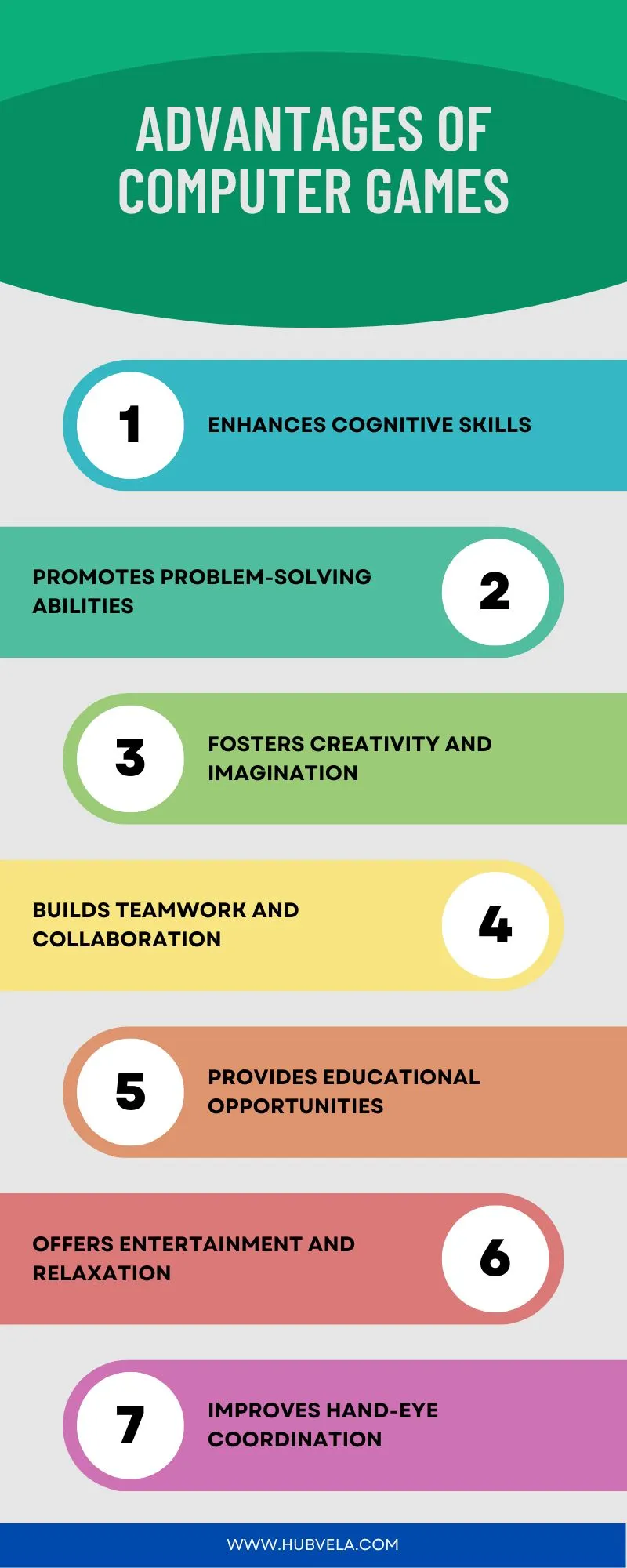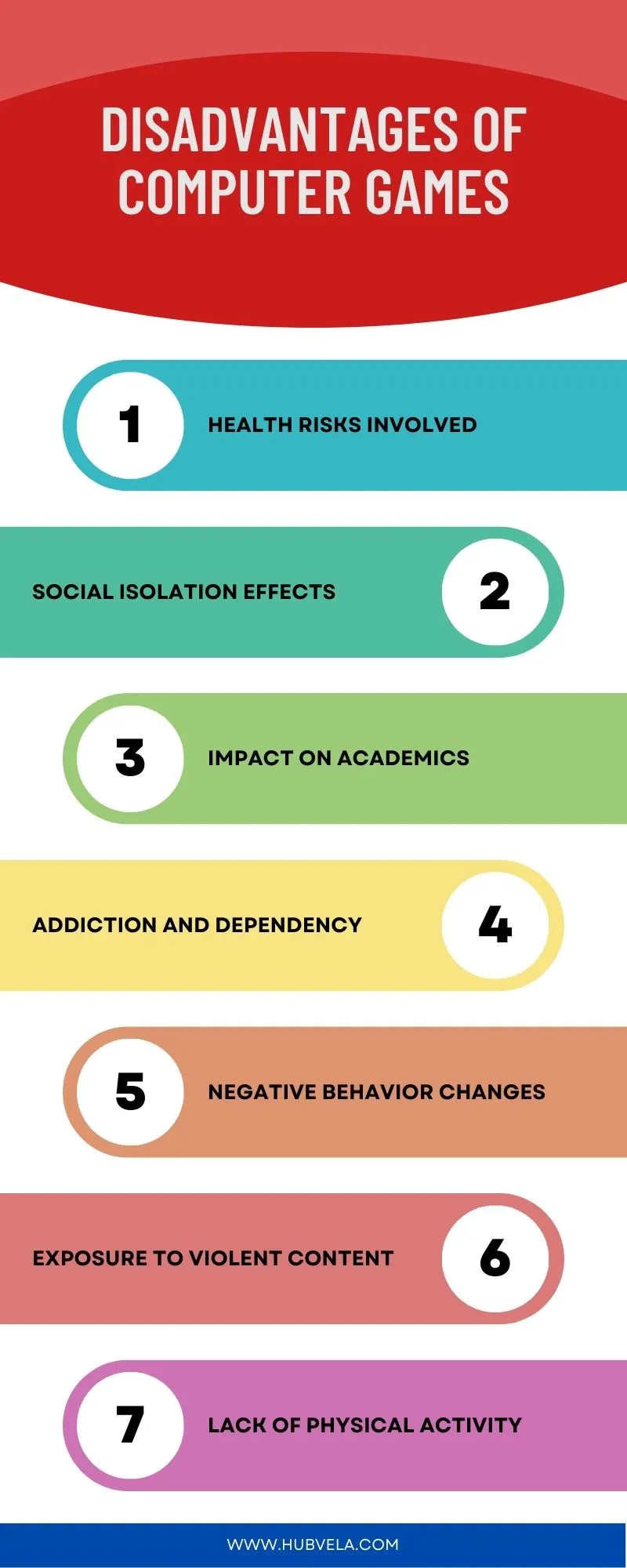Are you ready to embark on a digital adventure?
Computer games have become a symbol of our modern era, captivating millions of players worldwide. In this fast-paced world, they offer a thrilling escape and a chance to test your skills.
But like any coin, there are two sides to consider. Understanding the advantages and disadvantages of computer games is crucial for making informed decisions about your gaming experience.
On one hand, these games can enhance your cognitive skills, promote problem-solving abilities, and foster creativity.
On the other hand, they may lead to negative behavior changes, expose you to violent content, and limit physical activity.
So, let’s dive in and explore the pros and cons of computer games together.

--Advertisement--
Advantages of Computer Games
Computer games have been a significant part of our daily lives, especially in the digital age we currently live in. They offer a wide range of benefits for both children and adults, including cognitive, motivational, emotional, and social advantages.
We aim to explore the positive aspects of computer games and how they can contribute to personal growth and development.

1. Enhances Cognitive Skills
Improve your cognitive skills with computer games through problem-solving, critical thinking, and strategic decision-making.
Playing computer games can enhance cognitive development by challenging your problem-solving skills. Many games require you to think critically and find solutions to complex puzzles or obstacles, which can improve your ability to think logically and analytically.
Additionally, computer games can help you develop strong decision-making skills. In-game scenarios often require quick and strategic decision-making, forcing you to evaluate different options and choose the best course of action.
Furthermore, computer games can enhance your multitasking abilities. Many games require you to perform multiple tasks simultaneously, helping you develop the ability to prioritize and manage multiple objectives efficiently.
2. Promotes Problem-Solving Abilities
Enhance your problem-solving abilities with computer games.
Engaging in computer games can have several advantages when it comes to improving critical thinking, enhancing problem-solving skills, developing analytical abilities, fostering creativity, and promoting strategic thinking.
These games often require players to think critically and find solutions to complex problems within the virtual world. By constantly facing challenges and obstacles, players are encouraged to think outside the box and come up with innovative solutions.
Computer games also provide a platform for developing analytical skills, as players need to analyze different situations, assess risks, and make strategic decisions.
Furthermore, these games allow individuals to exercise their creativity by designing characters, building virtual worlds, and solving puzzles in unique ways.
3. Fosters Creativity and Imagination
Unleash your creative potential and let your imagination soar through the immersive world of computer games. Engaging in computer games not only provides entertainment but also offers numerous benefits for creativity and imagination development.
Through these games, you can explore vast virtual landscapes, create unique characters, and embark on exciting adventures that encourage artistic expression. The interactive nature of computer games allows you to problem-solve within the game’s challenges, enhancing your problem-solving skills and critical thinking abilities.
Additionally, computer games often present players with open-ended scenarios, allowing for endless possibilities and encouraging creative thinking and innovative solutions. By immersing yourself in these virtual worlds, you can tap into your creativity, develop your imagination, and unlock your artistic potential.
Computer games truly offer a platform for personal growth and self-expression.
4. Builds Teamwork and Collaboration
Engage with others and work together towards a common goal by participating in computer games, fostering teamwork and collaboration. Playing computer games requires effective communication skills to coordinate actions and strategies with teammates. It also promotes problem-solving strategies as players encounter obstacles and challenges that need to be overcome collectively.
The dynamics of a team are developed and strengthened through these games, as individuals learn to trust and rely on each other’s abilities. Additionally, computer games enhance decision-making abilities by encouraging players to make quick and strategic choices to achieve the team’s objectives. Conflict resolution skills are also honed as players learn to manage disagreements and find compromises to ensure the team’s success.
5. Provides Educational Opportunities
One advantage of computer games is that they offer educational opportunities. Computer games have numerous educational benefits and provide a learning potential that’s often overlooked.
These games can offer academic advantages by allowing players to acquire knowledge in various subjects. Whether it’s history, science, or language skills, computer games can be designed to enhance learning in a fun and interactive way.
Through gameplay, players can develop critical thinking skills, problem-solving abilities, and improve their cognitive abilities. Computer games also provide a platform for skill development, such as hand-eye coordination and strategic thinking.
With the right guidance and selection of games, computer games can be a valuable tool for educational purposes, making learning an enjoyable experience.
6. Offers Entertainment and Relaxation
Computer games provide a source of entertainment and relaxation for players of all ages. The entertainment benefits of playing computer games are numerous. They offer immersive experiences that transport you to different worlds and allow you to engage in exciting adventures. These games can also provide stress relief by allowing you to escape from the pressures of everyday life and unwind.
Additionally, computer games can foster social interaction, whether through multiplayer online games or local multiplayer options. This social aspect allows you to connect with friends and even make new ones through shared gaming experiences.
Moreover, computer games can have therapeutic effects, such as improving hand-eye coordination and problem-solving skills. Overall, computer games offer a variety of entertainment benefits that can provide relaxation and enjoyment for players.
7. Improves Hand-Eye Coordination
You can significantly improve your hand-eye coordination by regularly playing computer games.
Computer games require you to coordinate your hand movements with the visual stimuli on the screen, which improves your reflexes and enhances your motor skills.
As you navigate through the virtual world, you need to concentrate on the game’s objectives, which boosts your concentration abilities.
Additionally, the fast-paced nature of many computer games requires you to quickly switch between different tasks and actions, thus increasing your multitasking abilities.
Moreover, computer games enhance your visual perception as you learn to interpret and respond to the visual information presented on the screen.
Disadvantages of Computer Games
Video games have gained immense popularity worldwide, with almost 3 billion gamers in 2021. Although playing video games has been linked to improved cognitive functions, problem-solving skills, and social activity, it is important to consider the potential disadvantages as well.
In this discussion, we will explore some of the disadvantages of playing computer games.

1. Health Risks Involved
Are there any health risks involved in playing computer games?
While gaming in moderation can have certain benefits, excessive gaming can lead to various health risks, both in the short term and long term. One of the main concerns is the impact on mental health. Excessive gaming can contribute to increased levels of anxiety, depression, and social isolation.
Additionally, prolonged periods of sitting and lack of physical activity can lead to physical health problems such as obesity, muscle strain, and poor posture.
Moreover, addiction to computer games can have severe consequences and may require addiction prevention measures. It’s important to strike a balance and prioritize both mental and physical well-being while enjoying the world of computer games.
2. Social Isolation Effects
Excessive gaming can lead to social isolation, as individuals may spend a significant amount of time playing games instead of interacting with others. This can have detrimental effects on mental health, as prolonged isolation can lead to feelings of loneliness, depression, and anxiety.
Additionally, the impact on social skills is significant, as individuals may struggle to communicate effectively or form meaningful relationships outside of the gaming world. Furthermore, addictive tendencies can further exacerbate social isolation, as individuals may prioritize gaming over other important aspects of life, such as work or relationships.
The potential for cyberbullying is also a concern, as online gaming communities can be breeding grounds for harassment and abuse. Lastly, excessive gaming can lead to a sedentary lifestyle, resulting in physical health issues such as obesity and musculoskeletal problems.
It’s essential to find a balance between gaming and social interaction to avoid the negative consequences of social isolation.
3. Impact on Academics
While excessive gaming can have negative effects on social interactions, it can also significantly impact academic performance.
One of the major challenges that gamers face is time management. Spending excessive hours playing games can lead to neglecting important academic tasks, such as studying or completing assignments.
Additionally, the constant stimulation and excitement provided by games can make it difficult for gamers to concentrate and focus on their academic work. This lack of concentration can result in lower grades and decreased academic performance.
Furthermore, excessive gaming can also affect social interactions, as gamers may prioritize playing games over spending time with friends or participating in social activities.
Lastly, although games can help develop problem-solving skills, excessive gaming can hinder the development of other important academic skills, such as critical thinking and creative problem-solving.
4. Addiction and Dependency
You might frequently find yourself becoming addicted and dependent on computer games. This dependency can have serious consequences.
Addiction to computer games can lead to neglect of responsibilities, such as school or work, and can even result in social isolation. Signs of addiction include an intense preoccupation with gaming, loss of interest in other activities, and withdrawal symptoms when not playing.
To prevent addiction, it’s important to set limits on gaming time and engage in a variety of activities. If you or someone you know is struggling with addiction to computer games, there are treatment options available.
Therapy, support groups, and counseling can help address the underlying issues and develop healthier habits. It’s crucial to recognize the impact on relationships and take steps to maintain a healthy balance between gaming and other aspects of life.
5. Negative Behavior Changes
If you find yourself becoming addicted and dependent on computer games, it can lead to negative behavior changes.
The emotional impact of excessive gaming can result in mood swings, irritability, and even depression.
Spending excessive time playing games can also negatively affect your social skills, as you may isolate yourself from real-life interactions and relationships.
Additionally, the lack of time management skills that often accompanies gaming addiction can lead to neglecting responsibilities and important tasks.
Another concerning aspect is the potential aggression effects of violent computer games, which can make you more prone to displaying aggressive behavior in real life.
It’s important to be aware of these negative behavior changes and take steps to maintain a healthy balance between gaming and other aspects of your life.
6. Exposure to Violent Content
Playing computer games exposes you to violent content, which can have detrimental effects on your behavior and mindset. The psychological effects of this exposure are a concern for both parents and experts.
Constant exposure to violence in games can lead to desensitization, making you less sensitive to real-life violent situations. This desensitization may result in a decreased ability to empathize with others and an increased tolerance for aggression.
Furthermore, the influence on aggression levels is another area of concern. Studies have shown that individuals who play violent computer games tend to exhibit more aggressive behavior compared to those who do not.
It’s crucial for parents to ensure that their children are playing age-appropriate games that don’t contain excessive violence. Being aware of the potential negative effects of exposure to violent content in computer games can help you make informed decisions about the games you choose to play.
7. Lack of Physical Activity
Exposure to violent content in computer games can have detrimental effects on your behavior and mindset. Engaging in computer games often leads to a sedentary lifestyle, where individuals spend long hours sitting and using minimal energy. This physical inactivity can contribute to obesity concerns and various health implications.
With prolonged periods of sitting and lack of exercise, your body becomes more prone to weight gain, muscle weakness, and decreased cardiovascular fitness. Additionally, the lack of physical activity can negatively impact your mental health, leading to increased stress levels and decreased overall well-being.
It’s important to find a balance between computer gaming and physical activity to maintain a healthy lifestyle and mitigate the potential negative effects of excessive screen time.
Conclusion on Advantages and Disadvantages of Computer Games
To form a well-rounded perspective on the advantages and disadvantages of computer games, it’s crucial to consider the impact they’ve on your cognitive abilities, social interactions, and overall well-being.
Computer games can have both positive and negative long-term effects on individuals. On one hand, they’ve been shown to improve problem-solving skills, hand-eye coordination, and multitasking abilities. On the other hand, excessive gaming can lead to decreased physical activity, poor academic performance, and addiction.
Additionally, computer games have a significant cultural impact, shaping trends and influencing popular culture. Parental control plays a crucial role in ensuring that children and teenagers engage in appropriate and balanced gaming habits.
Technological advancements continue to enhance the gaming experience, providing more immersive and realistic gameplay. However, it’s important to be aware of the potential psychological implications, such as increased aggression and desensitization to violence.


